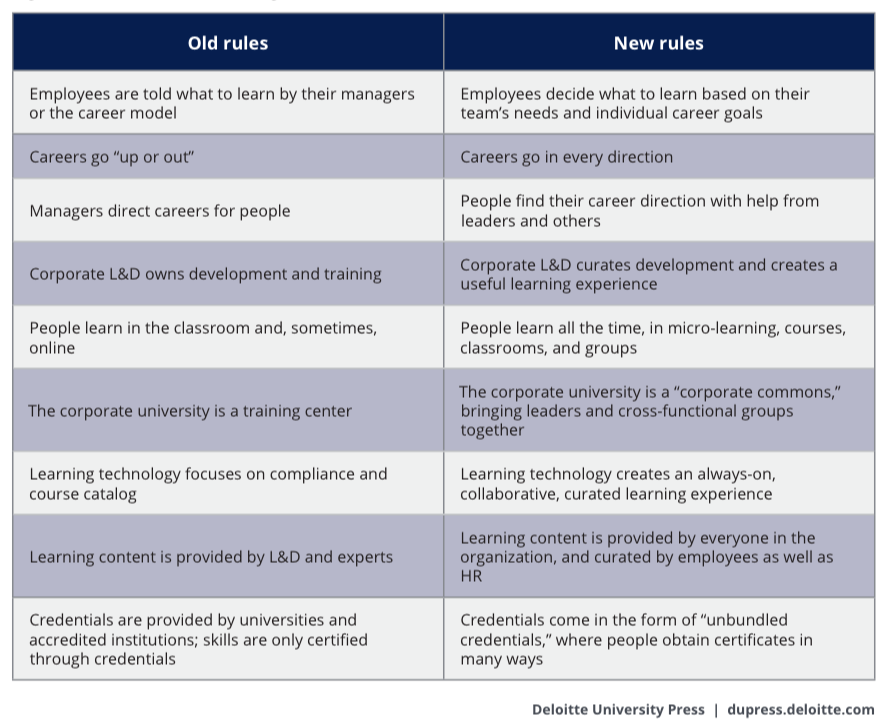
The need of skills development in a digital transformation context
This piece was written by Lucian Ghinda – Co-founder of DevAcademy and Innovation Master @METRO SYSTEMS Romania & Corina Elena Matu – Talent Acquisition Specialist @METRO SYSTEMS Romania
Our jobs are changing. They are more digital, more diverse, global, automation-savvy, and social media-proficient and we must continuously improve our skill-set to stay fresh on the market. One step ahead is to lay a solid skill foundation, then to learn by working with each situation that offers you an opportunity to apply your knowledge.
Technology will replace some of our jobs. AI and robotics will replace up to 30% of our jobs by the early 2030s. A report from PricewaterhouseCoopersestimated that a higher proportion of jobs are at risk of automation, especially those lower levels of education. Even now the workforce is facing job skills mismatch, nevertheless, in the near future, we have to get ready for this transformation.
If we fail to respond, we will stagnate – says Rainer Stack in his TED video regarding workforce crisis of 2030.
How can we prepare to embrace these advancements?
For today’s digital organizations the biggest challenge is to approach learning and development. That is why microlearning is becoming so popular. More and more learning online systems now link training interventions directly to someone’s role and encourage interaction through social-media interfaces and links to internal networking platforms, and also extend to features as Mobile delivery, VR, AR and AI. This method includes moderated small and whole group discussion, guided reading, reflection, self-directed exploration, and hands-on creation. The materials are handled through email and discussion forums. The Moodle platforms are supplemented by various other social and collaborative media.
The flat structured organizations believe in the 70:20:10 principles.
First, what flat organizations look like. Well, unlike other structures they are exactly that… flat. That means there are no ‘exaggerated’ job titles, no management hierarchy, there is only the team and everyone is seen as equal. There are often called self-managed organizations.
Second, the 70:20:10 principle meaning: 70 percent of learning should come from on-the-job experience, 20 percent through social learning with colleagues, and only 10 percent through formal learning, such as online courses. This translates into rapid growth and also means roles change quickly. This principle creates more engagement, passion, agile mindset and empowers employees to access their own learning when they needed it and learn collaboratively while in their role.
This principle works well in a structured development program like traineeship programs, but those are created only for juniors. So what happens with those that need an innovation playground or for those that aim for up-skill?
Fast-Changing Technologies
Let’s address just one challenge (among many) in IT: the quick changes of technologies.
We have an increasing number of programming languages, frameworks, libraries, operating systems, virtualization, deployment environments and many more concepts.
It is not just that they are many, but on top of that, they are changing in some areas year after year. So it is very hard for a developer to keep track with all of this, to remain on top of one’s game by achieving results in daily work and in the same time learning what is new and what will probably be required in 6 months or less.
Because there are not easy and common solutions for learning we are now talking (for a couple of years already) about “developer fatigue” and recently with a focus on “web development fatigue” or “JavaScript fatigue” because they are the fields where the pace of change is accelerating. Almost the same (though on a different scale) it is happening also in other areas (backend programming, mobile development due to fragmentation, testing, …) and many more. See here an example of Frontend Fatigue and you can imagine that the same could happen in other areas, see for example Java 7 was released in 2011, Java 8 in 2014, Java 9 in 2017 and from now on there will be no 10 release. But just incremental versions which should point us in the direction of faster changing also in this stable world.
What learning models we have in this space?
We have the training/workshop approach where someone (usually an expert) comes and he/she is directing the learning. This is the most traditional approach. And it has some drawbacks, the biggest one in this context being that there are not enough experts to cover the new technologies because there is not enough time to become an expert. Another drawback is that the learning experience is not customized per person and it is a general experience.
Then we have other forms of learning, more direct.
Mentoring is the most common one, making the know-how transfer from someone with experience to someone with less experience. Sometimes with some twists like pair programming, mob programming, and other forms, all of them focused on creating a space/time for the colleagues to interact while working on their current product.
Bootcamps are another way of learning or programming retreats. All of them meaning focused time to work on something with the constraint of being in another place than your normal daily work.
The need to find other ways of learning includes VR, MOOCs and many other technology driven forms. Yet they are not a complete solution so the space for new ways of learning is still open and still searching for more.
Why is this urge for development?
Meanwhile, most of organisations realise that employee-employer relationship has changed and they started to invest in their employees’ success. Until now, not surprisingly, neither the employers nor employees profit as fully as they could from their relationship. Employers continually lose valuable people. Some employees fail to invest in their current position because they are constantly looking for new opportunities. Now it’s time for a new relationship framework between sides because a new set of working skills is needed for both parties.
Along new skills need and the new technologies, learning has gained a major role to play in career journey, so here are the old rules vs. new rules for careers and learning:

That’s why organizations should reimagine and redesign the ‘careers’, real time and all the time, so that learning experiences allow employees to build new skills quickly, easily.
Different generations are shaping the current business and working space: we have Millenials who are getting full power in leadership positions or senior/expert technical levels. We have Millenials who are on the verge of being the biggest workforce and — stereoptype or not — they have specific needs. And here there are Generation Z (those born on 2000s) who this year will enter full power into workforce through different ways: entrepreneurial, traineeships, internships, research and many more.
The learning process (in vast majority) is still very linked to old ways of information dissemination sprinkled in the last years with some focus on soft skills.
In the verge of automation, the human learning process, applied in IT, seems still old but mostly seems too slow to catch up with the times. The new path is not here yet.
We need to experiment more with learning, with interactions.
This is why at METRO SYSTEMS we are experimenting year by year with our learning processes. We have initiated a technical development program, Digital Coding Incubator, for those with more than 2 year working experience in Java or JavaScript frameworks that are willing to enhance their technical skills career with the newest cloud development technology stacks. After 3 to 6 months of learning and working in Digital Readiness products, the participants will take opportunities in our company’s most exciting development projects. Digital Readiness stands for the capability of METRO to deliver outstanding digital solutions on a global scale instantaneously.
We invite you all to share with us how digitalization impacts your learning experience!














